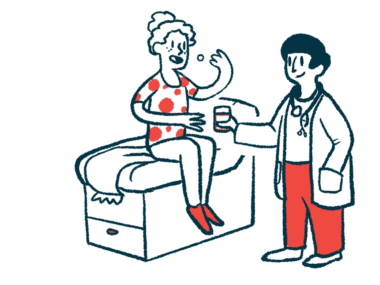This year, I’m honoring my diagnosis anniversary differently
A columnist approaches a difficult month with a new perspective
Written by |

Can the French teach us something new today?
According to Perspectives on History, “In French the word anniversaire means both ‘birthday’ and ‘anniversary,’ whereas in English the two concepts require separate words.” On birthdays, we remember when new life came into the world. Should we change how we view anniversaries?
June is here to mark the third anniversary of my myasthenia gravis (MG) diagnosis. I decided that this year, I’d honor it differently. For the previous two years, I pretended there wasn’t an anniversary. It was a form of denial. Now, I want to shed myself of this reaction and the negativity that accompanies it.
June was a special month
My “diaversary” — a term I borrowed from the diabetes community — has always seemed a dark day that I’d rather forget. I’ve often said that June 24, 2020, marked a death — the death of my life until then. I still work to process this. I still pick up the broken pieces. I’ve made some progress, but much work remains. Let me share how it relates to life with a rare disease.
In my family, June is a month of anniversaries. My parents and many aunts, uncles, and cousins were married in June. My dad, who lived for 16 years with MG, was born in June. So, too, were Marilyn Monroe, George H.W. Bush, and my nephew Joe.
Each June, we commemorate D-Day, the Watergate break-in, and Juneteenth. Before my MG diagnosis, June was full of positive anniversaries.
Since 2020, those anniversaries have been overshadowed by MG. The dismay and fear unleashed on my diagnosis day changed June for me. Each year since then, I grow lethargic and melancholic and withdraw from the world. It’s as if I’ve been frozen in time. Yet there’s comfort in knowing I’m not alone.
The diagnosis of any disease can often bring on post-traumatic stress disorder. My PTSD struggles are most intense each year during this month. Many members of the rare disease community have their own anniversaries that are accompanied by PTSD.
According to the American Psychological Association, “Some of the reactions those affected may experience as the anniversary date nears include difficulty concentrating, loss of appetite, irritable outbursts, nightmares, difficulty falling or staying asleep, and feelings of detachment from others.”
Inspirations
In July 1997, SMA News Today columnist Helen Baldwin‘s newborn, Jeffrey, was diagnosed with SMA and passed away a few months later. Helen wrote about her struggles around the diagnosis anniversary. For many of Helen’s years, her experiences were similar to mine. Nowadays, she has a more nuanced and positive understanding of the anniversary. She wrote of “experiencing prayer and faith at work, and becoming more attuned to how snippets of life come together. Incredible signs provide reassurance that the wings of our loved ones haven’t taken them so far away after all.”
The late ALS News Today columnist Rick Jobus‘ diagnosis led him on an unexpected spiritual journey. On the 13th anniversary of his diagnosis in 2020, Rick’s Aunt Barb gave him a bracelet. On it was a biblical inscription from Philippians 4:13: “I can do all things through him who gives me strength.”
Rick wrote, “That mantra has been part of countless preferred outcomes over the past 13-plus years for me. More importantly, those words are my assurance that ALS will not be my end.”
When Rick departed this life on June 19, 2022, he left behind a rich legacy of hope. He turned his ALS diagnosis and accompanying struggles into a model for how we can live full lives with rare diseases. Like him, we can still find meaning and purpose.
Join me as I change my ‘diaversary’
This June, I’ll honor Dad and my MG diagnosis. I’ll add some upbeat fun and positive celebrations. I’ll do some of what the digital therapeutics company Hedia recommends in its list of “10 ways to Celebrate your Diaversary”: “Thank your loved ones,” “Go out for a meal,” “Buy some bling,” “Reflect,” “Paaartaaay,” “Fundraise,” “Bake a cake.” We should probably do most, or all, of these things regularly — especially the bling and the partying.
There’s no correct path that leads to healthy acceptance of our “diaversaries.” The National Center for PTSD points out that “there is not one classic anniversary reaction. The anniversary reaction will differ among trauma survivors. It may depend on the type of trauma, how much time has passed since the trauma or loss, the qualities of that person, or other factors.”
I hope others will find reassurance from my journey. Rick Jobus, Helen Baldwin, and others reassured me. Please join me this month as I change my relationship to my “diaversary.” Like our French brothers and sisters, let’s make our anniversaries about new life. As my sister would say, “Let’s do this together.”
Note: Myasthenia Gravis News is strictly a news and information website about the disease. It does not provide medical advice, diagnosis, or treatment. This content is not intended to be a substitute for professional medical advice, diagnosis, or treatment. Always seek the advice of your physician or other qualified health provider with any questions you may have regarding a medical condition. Never disregard professional medical advice or delay in seeking it because of something you have read on this website. The opinions expressed in this column are not those of Myasthenia Gravis News or its parent company, Bionews, and are intended to spark discussion about issues pertaining to myasthenia gravis.




Leave a comment
Fill in the required fields to post. Your email address will not be published.